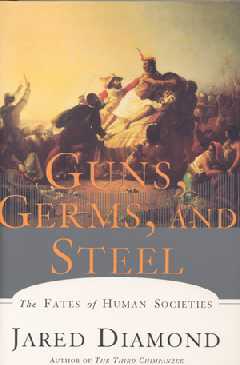 Another response to Guns, Germs, and Steel:
Another response to Guns, Germs, and Steel: Another response to Guns, Germs, and Steel:
Another response to Guns, Germs, and Steel:
After I wrote the following:
Because Diamond doesn't address the philosophical issues, he doesn't address why Europe conquered most of the world but China didn't.
Someone responded thusly:
>> Actually he does address this point, though in a very sketchy fashion. China filled its geographic niche early, and without competition to drive it, stagnated. The geography never favored unification of Europe and thus the various nation states were driven by competition to both improve their technology and expand elsewhere when that became feasible. <<
Okay, I take it back. He does address the point. He just doesn't do it successfully.
Diamond contrasts Chinese unity with European disunity and attributes most of the differences to that. I consider this argument weak.
For starters, he says "periods of disunity returned several times" to China, but "they always ended in reunification." Yes, periods of disunity like the regular overthrow of dynasties and the complete Mongol conquest of the country. That seems like enough to shake up the entrenched interests.
More to the point, Diamond admits that unity gave the Chinese culture a big advantage. But then suddenly it became a disadvantage. Why? Because singleminded courts supposedly could stifle innovation—halting overseas exploration, for instance.
But why didn't the Chinese attempt to colonize other continents during those periods of disunity? Why was the expansionist urge so briefly felt and so easily thwarted? How could one faction end the Chinese explorations if exploring was a fundamental part of the Chinese culture?
This is what I'm talking about. If an emperor imposed his views and no one challenged him, it was because the emperor and his people had a unified worldview. Namely, that authority was good and challenging authority was bad.
Obeisance to authority is a (stereo)typical Asian value. In China it was part and parcel of Confucianism as the Chinese interpreted it. As Wikipedia explains:
Like filial piety..., loyalty was often subverted by the autocratic regimes of China. Confucius had advocated a sensitivity to the realpolitik of the class relations that existed in his time; he did not propose that "might makes right", but that a superior who had received the "Mandate of Heaven" should be obeyed because of his moral rectitude. This, however, was soon reinterpreted and became a doctrine which demanded blind, unquestioning obedience to the ruler from the ruled.
A doctrine held by a government and its people is equivalent to a worldview.
|
. . . |

|
All material © copyright its original owners, except where noted.
Original text and pictures © copyright 2007 by Robert Schmidt.
Copyrighted material is posted under the Fair Use provision of the Copyright Act,
which allows copying for nonprofit educational uses including criticism and commentary.
Comments sent to the publisher become the property of Blue Corn Comics
and may be used in other postings without permission.